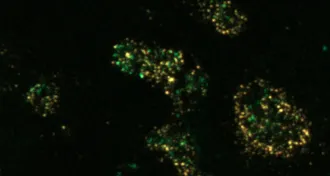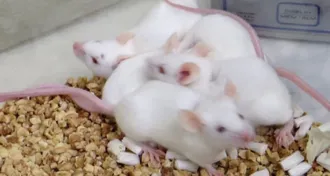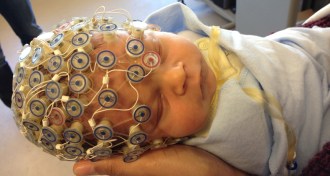Humans
Sign up for our newsletter
We summarize the week's scientific breakthroughs every Thursday.
-
 Health & Medicine
Health & MedicineEating nuts may extend a person’s life
People who regularly ate peanuts or tree nuts were less likely to die during decades-long studies.
By Nathan Seppa -
 Genetics
GeneticsAncient Siberian bones clarify Native American origins
Some New World ancestors came from western Eurasia, not East Asia.
-
 Life
LifeBlood clotting disorder blocked in dogs
Gene therapy stopped severe bleeding in dogs with the blood clotting disorder hemophilia.
-
 Health & Medicine
Health & MedicineCage temps change tumor growth in mice
Cooler living conditions may influence lab mice's responses to experimental cancer therapies that target the immune system.
-
 Anthropology
AnthropologyHuman ancestors threw stone-tipped spears at prey
African discoveries show that hunting weapons thrown from a distance appeared by 279,000 years ago.
By Bruce Bower -
 Health & Medicine
Health & MedicineQuick cooling after cardiac arrest questioned
For a decade, doctors have made induced hypothermia standard practice.
By Laura Beil -
 Health & Medicine
Health & MedicineChanges in malaria parasite may make Africans more susceptible
Ominous signals are emerging simultaneously in population studies and under the microscope that Plasmodium vivax, a malaria parasite well known in Asia and Latin America, may have found a way to infect Africans.
By Nathan Seppa -
 Humans
HumansHumans’ music and genes may have evolved together
Music may be a tool scientists can use to trace human migrations.
-
 Health & Medicine
Health & MedicineOld drug, new tricks
Metformin, cheap and widely used for diabetes, takes a swipe at cancer.
By Nathan Seppa -
 Health & Medicine
Health & MedicineExercise while pregnant may boost baby’s brain
Babies born to moms who exercised during pregnancy showed higher levels of brain maturity.
-
 Health & Medicine
Health & MedicineNicotine withdrawal linked to specific brain cells in mice
A group of cells within one brain region may control the physical symptoms that plague people trying to kick their cigarette addiction.
-
 Psychology
PsychologyDo you want the good news or the bad news first?
Do you want to hear the good news or the bad news first? A new study purports to answer the question. But can we apply this to how we deliver news? Well, I have good news, and I have bad news.